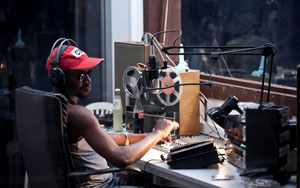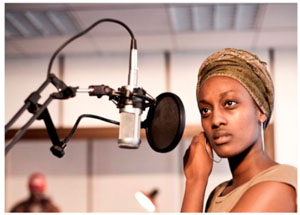
A former student of Pierre Bourdieu in Paris, Rau intertwines all his skills to “make major historical events accessible to spectators”. Whether he chooses to evoke The Last Hours of the Ceausescus (2009), the Norwegian massacre on Utoya Island (Breivik’s Declaration, 2012) or, most recently, the conviction of the Russian feminists Pussy Riot (The Moscow Trial, 2013), Rau’s work is distinguished by aesthetic and intellectual rigour.
Following extensive research and interviews with contemporary witnesses of the Rwandan genocide in 1994, the script for HATE RADIO is based primarily on excerpts of real transmissions made by the popular Rwandan radio station RTLM – one of the most cynical propaganda instruments deployed during the Rwandan Genocide. “If one had looked for a simple and effective target to prevent this atrocious crime against humanity”, journalist Philip Gourevitch commented, “RTLM would have been a good start”. With indescribable cynicism, the popular broadcaster masterminded an advertising campaign for genocide for months. The schedule consisted of pop music, exciting sport reports, political pamphlets and incitements to murder – a dark laboratory of racist ideology.

HATE RADIO allows the inflammatory Kigali radio station to return to the airwaves again: within a reconstructed radio studio that is separated from the viewers by glass walls, a broadcast from RTLM is staged and transmitted to audience members’ headphones. The radio hosts – three Hutu extremists and the Italian-Belgian Georges Ruggiu – are interpreted by actors, some of whom were affected by these events themselves.
Audiences are not only confronted with human beings being “talked out of” their humanity but, simultaneously, become sympathetic witnesses to the destructive and indelible consequences. During the performance, the walls of the set serve as projection surfaces for a video installation of selected stories from former perpetrators and victims, assembling original material from RTLM, texts from extremist publications and witness statements into a complex mosaic that deliberately explores contradictions. HATE RADIO is performed live by Afazali Dewaele, Sébastien Foucault, Diogène Ntarindwa and Bwanga Pilipili, with dramaturgy by Jens Dietrich.

The International Institute of Political Murder (IIPM) was founded in 2007 by Milo Rau with the aim of intensifying and theoretically reflecting on the interchange among theatre, fine arts, film and research in the area of re-enacting (disquieting) historical events. The basis for these attempts at staging incomprehensible moments in history that, properly speaking, cannot be staged, is provided by extensive research in archives as well as interviews with contemporary witnesses. The theatrical, cinematic, literary, and artistic installations of the IIPM confront the audience with historically relevant events while situating the latter within broader current-day discussions.
The Cape Town performances of HATE RADIO will take place on 7, 8 and 9 February 2014 at 20:00 in Hiddingh Hall; University of Cape Town (UCT) Hiddingh Campus, Orange Street, Cape Town. Attendance is free of charge, but seating is limited and booking is essential. Please direct all bookings to gipca.bookings@gmail.com. No under 16’s; French with English subtitles. For more information, contact the GIPCA office on 021 480 7156 / fin-gipca@uct.ac.za.
The performances in Cape Town form part of a Southern African tour of the work supported by the Goethe-Institut and Pro Helvetia, the Swiss Arts Council. For additional information on the HATE RADIO performances in Johannesburg (13-16 February) and Maputo (20-21 February), contact Benjamin Keuffel: pr@johannesburg.goethe.org / 011 442 3232 / 082 769 3254.
Hate Radio video recording:



Start: 7 Feb ’14 8:00 pm
End: 9 Feb ’14 10:00 pm
Cost: Free
Category: Performance
Organizer: GIPCA
Email: fin-gipca@uct.ac.za
Venue: Hiddingh Hall
Phone: +27 21 480 7156
Address: UCT Hiddingh Campus, 31 Orange Street, Cape Town, 8001
